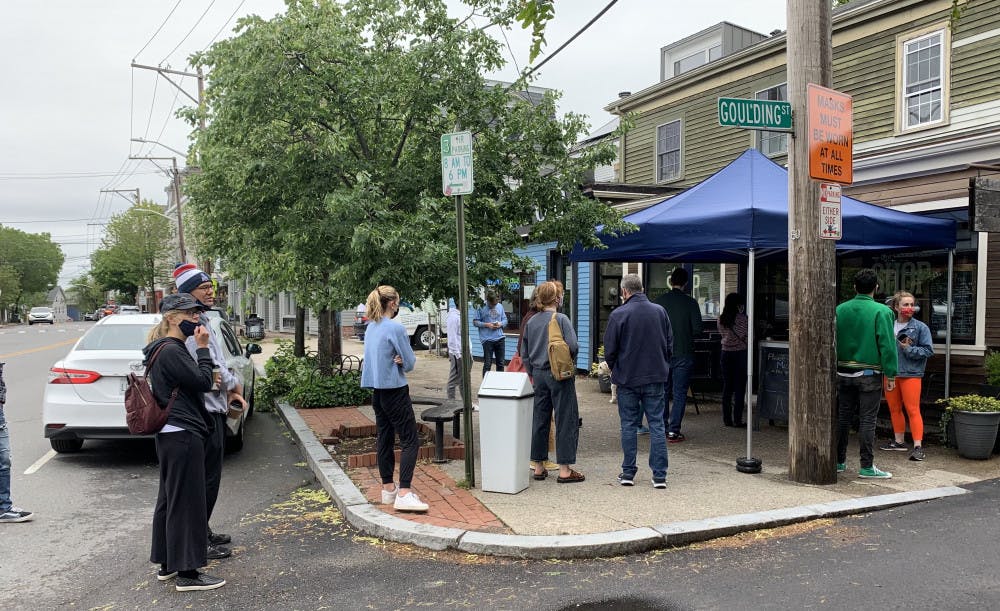After over a year of restrictions on restaurants, owners on the East Side have been hungry to return to full indoor dining experiences. Now that Rhode Island has officially reopened as of May 21, they are doing just that.
The state’s reopening means that there are no longer any restrictions on indoor dining, with masking and physical distancing requirements left up to the discretion of business owners.
Despite facing financial hardship due to lockdowns and limited dining capacity, restaurant owners are hopeful that both profits and community engagement will return to pre-pandemic levels as more residents get vaccinated and go out to eat.
Chinatown on Thayer is currently undergoing an expansion so that the location can accommodate more in-person dining, after which it will begin to invite patrons to eat indoors for the first time since the start of the pandemic, Mike Boutros, owner of Chinatown and Mike’s Calzones, wrote in a message to The Herald. He is optimistic that business will ramp up as more local residents get vaccinated.
Masking will remain mandatory at the restaurant, he said, even after Rhode Island lifted its mask mandate in accordance with updated guidance from the Centers for Disease Control and Prevention.
“Most of my staff has been fully vaccinated and at this point I am happy to say I am not as worried about their health as before,” Boutros wrote. “However, that does not mean I am not worried at all as there are still cases and we all need to be cautious.”
Boutrous’ cautiousness is one shared by other business owners as well, some of whom are still hesitant about resuming full in-person operations.
John Paul Murton, co-owner of The Shop on Wickenden, said he would not allow indoor dining until a higher percentage of the Rhode Island population is vaccinated. The Shop has not had indoor seating since March 2020, but he is hopeful that it will soon resume its pre-pandemic operations, as his staff have all gotten vaccinated and the state’s COVID-19 cases continue to decline.
In the early months of the pandemic, The Shop encountered some financial struggles, but soon adjusted, Murton said. Overall The Shop has been able to weather the pandemic without indoor service, he said.
The pandemic also helped the cafe to streamline its serving process and expand its online ordering capabilities. Customers now order outdoors at a window counter, and staff prepare food and beverages inside. Staff members have tried to maintain friendly interactions with customers despite the limited contact, he added.
The pandemic “has fundamentally changed the business that we are, but we’ve made efforts to still make connections at the door whenever possible,” Murton said. “The business itself is really intact.”
Ten One Tea House opened in July 2020 amid turnover on Thayer Street due to the pandemic. Owner Jason Yu said that the store has begun allowing a limited number of patrons to enjoy their tea inside the shop now that the state has lifted dining restrictions.
“We’ve opened it up,” Yu said. “During the pandemic, business was not as good, but we’re still surviving.”
While most of Ten One Tea House’s products and drinks are easy to take out, rising prices for ingredients reduced its profit margins. Not only have herbs used in its tea become more costly to import, but there has also been a boba shortage in the United States that has directly impacted Ten One Tea House.
Yu explained that some offerings on the menu, such as Ten One’s grapefruit tea, require ingredients that have become so much more expensive during the pandemic that the products are no longer profitable. Still, the store has kept the drinks on their menu —- charging enough to break even, but no longer making a profit.
Yu said that despite some struggles, he hopes business will improve with first-year students being on campus for the summer and the easing of the pandemic.
All three restaurant owners who spoke to The Herald are excited to return to normal interactions with customers and the broader community. The Shop’s Murton emphasized the importance of fostering trust and respect with fellow residents, and said that restaurants can be a place to create those relationships.
“The thing that became very clear very quickly because of the pandemic was how much (community) actually does mean, both to individuals but also to the business and the business’ bottom line,” Murton said. “We’re looking forward to actually being in that space with people again.”

Katy Pickens was the managing editor of newsroom and vice president of The Brown Daily Herald's 133rd Editorial Board. She previously served as a Metro section editor covering College Hill, Fox Point and the Jewelry District, housing & campus footprint and activism, all while maintaining a passion for knitting tiny hats.





